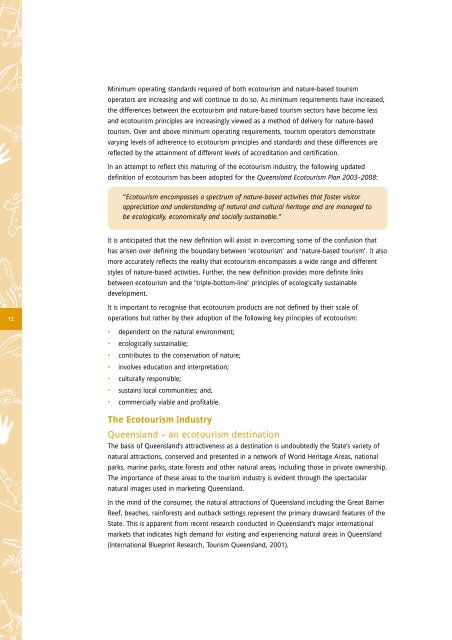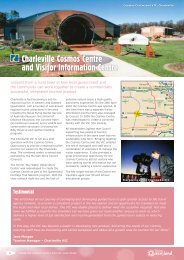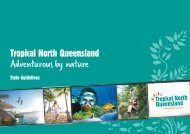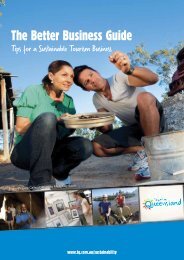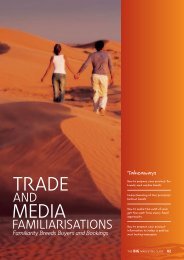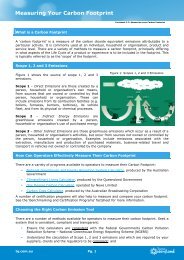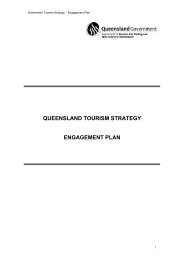Queensland Ecotourism Plan 2003-2008 - Tourism Queensland
Queensland Ecotourism Plan 2003-2008 - Tourism Queensland
Queensland Ecotourism Plan 2003-2008 - Tourism Queensland
Create successful ePaper yourself
Turn your PDF publications into a flip-book with our unique Google optimized e-Paper software.
Minimum operating standards required of both ecotourism and nature-based tourism<br />
operators are increasing and will continue to do so. As minimum requirements have increased,<br />
the differences between the ecotourism and nature-based tourism sectors have become less<br />
and ecotourism principles are increasingly viewed as a method of delivery for nature-based<br />
tourism. Over and above minimum operating requirements, tourism operators demonstrate<br />
varying levels of adherence to ecotourism principles and standards and these differences are<br />
reflected by the attainment of different levels of accreditation and certification.<br />
In an attempt to reflect this maturing of the ecotourism industry, the following updated<br />
definition of ecotourism has been adopted for the <strong>Queensland</strong> <strong>Ecotourism</strong> <strong>Plan</strong> <strong>2003</strong>–<strong>2008</strong>:<br />
“<strong>Ecotourism</strong> encompasses a spectrum of nature-based activities that foster visitor<br />
appreciation and understanding of natural and cultural heritage and are managed to<br />
be ecologically, economically and socially sustainable.”<br />
It is anticipated that the new definition will assist in overcoming some of the confusion that<br />
has arisen over defining the boundary between ‘ecotourism’ and ‘nature-based tourism’. It also<br />
more accurately reflects the reality that ecotourism encompasses a wide range and different<br />
styles of nature-based activities. Further, the new definition provides more definite links<br />
between ecotourism and the ‘triple-bottom-line’ principles of ecologically sustainable<br />
development.<br />
12<br />
It is important to recognise that ecotourism products are not defined by their scale of<br />
operations but rather by their adoption of the following key principles of ecotourism:<br />
• dependent on the natural environment;<br />
• ecologically sustainable;<br />
• contributes to the conservation of nature;<br />
• involves education and interpretation;<br />
• culturally responsible;<br />
• sustains local communities; and,<br />
• commercially viable and profitable.<br />
The <strong>Ecotourism</strong> Industry<br />
<strong>Queensland</strong> – an ecotourism destination<br />
The basis of <strong>Queensland</strong>’s attractiveness as a destination is undoubtedly the State’s variety of<br />
natural attractions, conserved and presented in a network of World Heritage Areas, national<br />
parks, marine parks, state forests and other natural areas, including those in private ownership.<br />
The importance of these areas to the tourism industry is evident through the spectacular<br />
natural images used in marketing <strong>Queensland</strong>.<br />
In the mind of the consumer, the natural attractions of <strong>Queensland</strong> including the Great Barrier<br />
Reef, beaches, rainforests and outback settings represent the primary drawcard features of the<br />
State. This is apparent from recent research conducted in <strong>Queensland</strong>’s major international<br />
markets that indicates high demand for visiting and experiencing natural areas in <strong>Queensland</strong><br />
(International Blueprint Research, <strong>Tourism</strong> <strong>Queensland</strong>, 2001).


